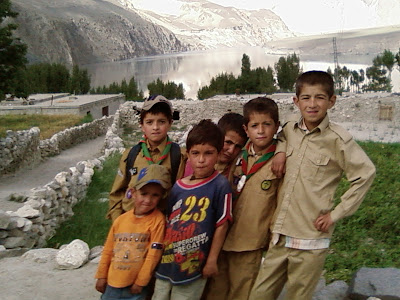Health, food supply, education and energy sector are some of crucial areas that governments in past have given least attention. And among them, the vulnerable condition of health and power facilities across Hunza has caused to increase miseries of locals who are currently in state of war with natural forces after Attaabad land slide.
 HUNZA: Dr. Iqbal, giving interview to RDs Times. Readers' Time Photo
HUNZA: Dr. Iqbal, giving interview to RDs Times. Readers' Time PhotoAccording to available statics, the nascent Hunza-Nagar district has total population of around 1,28,867 individuals with an area of around 14,560 square kilometer; it comprises two subdivisions, four tehsils, 15 union councils:8 in Hunza and 7 in Nagar. To a population more than 0.129 million, only five government run hospitals with total capacity of 55 bed strength along with 13, though many ghost dispensaries exists with only five family physicians. Similarly, contrary to the claims of current regime for having commitment to eliminate critical diseases, there are only 2 technicians for T.B control programme for the whole district.
Federal government through Self rule empowerment and reform package, 2009 has taken few initiatives in Gilgit-Baltistan around half an year ago. Civil hospital Aliabad, which has been the only one male family physician for scattered population. Doctor Iqbal is the head of district head quarter hospital and supposed to make efforts to cater the needs of population of both Hunza and Nagar was upgraded with the completion of PC-4, thirty bed hospital in its premises into District Head Quarter hospital. Gilgit-Baltistan government fulfilling its pledge of provision of health facilities appointed a district health officer in March 2010. Doctor Iqbal Haider is currently working as District Health officer (DHO). Readers Time has conducted an interview which is being published for readers.
RDsTime: Would you please tell us about your education and work experience in your career?
Dr. Iqbal: Well, I did my graduation from Ayub medical college, Abbotabad in 1998. Then I opted for Family PlanningAssociatin for Pakistan in September and served by the ended of 2000. I joined World Health Organization in 2000 and worked there by the end of 2005. During this tenure, I completed Diploma in Health Care System Management from college of Physicians and Surgion, Karachi Pakistan. Then I was able to complete Master in Public Health (MSPH) within next two years from Qaid-e-Azam University, Islamabad. In April 2005, I was sellected as Assistant district Health officer in Gilgit and worked till the mid of year 2009. Then I was appointed by Federal Service Commission Islamabad as District Health Officer (DHO) in April, 2010 and since am working in the same capacity here in Hunza-Nagar district.
RDs Time: Gilgit-Baltistan government created new district health office to upgrade and ensure health facilities inHunza-Nagar. But since its creation no change occurred, rather proved a nine days wonder during days of alert. what was reason behind that?
Dr. Iqbal: Actually, when I assumed responsibilities as District Health Officer of the nascent Hunza-Nagar district,I found multitude of problems ranging from lack of general medicines to round the clock medical staff to tackle emergency cases. Realizing the dire situation, I did my best to ensure possible medical facilities. You know, there was a hype of flesh floods in down stream ahead of spill in May, 2010. Besides fulfillment of my duties, I had to ensure my presence to answer any question by media persons in the head quarter hospital, my service station and accompanying VIPs visits, simultaneously. In this critical time, when I constantly faced shortage of resources, I utilized the experience, skills and knowledge retained during services with UN agencies.
RDs Time: You said that you faced both personnel and medicines even on the peak of possible disaster. While, according to independent resources, both of them influx in the region from doner agencies. Where they gone?
Dr. Iqbal: I agree that many Donner agencies provided both medicines and personnel as a contribution in relief operations. Yet, a large portion of them has been utilized by proper distribution among the major hospitals and supporting basic health units both in Up and down stream. Provincial, federal and regional government constantly provided with us required back up when needed. As for as the quantity of medicines and number of personnel are concerned, as per plan was allocated with respect of the population of zones in the district. Our staff remain vigilant 24/7 and our ambulance service provided maximum facility in hour of need.
RDs Time: It is said that there are insufficient staff to ensure smooth running of facilities. Similarly, few who exist have been entrusted work beyond their capacity. Local public circles blame GB bureaucracy for resorting to delaying tactics to employ non-local people. Do you feel comfortable enough to dispense duties in the existing situation?
Dr. Iqbal: As for as the creation of positions in the new set-up here in Hunza-Nagar district is concerned, that is actually job of Gilgit-Baltistan Planning and services department. I personally have forwarded request for provision of properpersonnel and infrastructure. Nevertheless, there is no any response from respective departments yet. The existing structure requires at least 52 staff compared to only eight staff working currently. I am actually driven by zeal for service of humanity; and being a son of the soil, I did not voice over even personal perks being provided to the same in other areas of the region.I still draw the pay lower than the scale of my appointment is an evidence of that
RDs Time: As you aforementioned that currently you do have very insufficient staff to deliver the work especially those who render medical services to the masses. What did you have done to overcome obstacle if the GB government remains ignorant to the demand of proper staff on pretext of scarcity of funds?
Dr. Iqbal: I explicitly mentioned here that we do have few staff compared to the current need. At the time of creation of the district health office, I managed to bring existing ones from different hospitals of Hunza and Nagar. Planning and services departments still silent over my proposal of additional staff for unknown reasons. I have clearly mentioned the supporting staff to DHO, establishment and recruitment of staff for Disaster Health management office, and Expanded Programme for Immunization (EPI) and allocation of fund for cold rooms. We have currently very few base line indicators to curve the infant mortality rates and our proposal also include a special allocation of funds in this regard in health sector in the budget.
RDs Time: We have had a single family physician (medical officer) to cater the needs of hundreds of thousands of indigenous masses having low income sources who rely on government run medical facilities. No additional medical staff especially the lady doctors have been appointed in the major hospitals. Why is this so?
Dr. Iqbal: Well, one major reason behind lack of appointment of additional is that the newly appointed medical doctors were reluctant to render their services in the valleys of the region that lack facilities ranging from communications to proper accommodation. Moreover, they argue that there exist very little avenues for private practice. That is why, medical professionals even those pertain to the GB region prefer to opt for cities instead of towns and villages. And the regulation and monitoring is the task of services department that can answer this question well.
RDs Time: There equipments outside the operation theater for more than a year. With the creation of district health office people cherished expectations for better facilities through immediate instalation. But nothing could get done and lyingvulnerably in open air? Why these could not be installed to reduce depreciation cost?
Dr. Iqbal: Basically, these equipments were purchased last year for ongoing PC-4 extension. We managed to keep them outside the operation theater to create space for minor surgical cases. Soon we hope to installed it as soon as the extension projectgets complete.
RDs Time: Patients complaint that they were not provided medicines for even minor illnesses and used to ask to purchase them on high prices from markets. What is your approach to address it?
Dr. Iqbal: I agree that there is lack of medicines in most of hospitals. Truly speaking, we get a cerain share from regional quota semi annually. This small quantity from quota is distributed among different hospitals. Health sector is another main sector still ignored in fiscal budget. We try our best to deliver and provide what we posses to the patients. We are optimistic to get additional share from qouta in the near future and that would solve the issue of lack of medicines
adequately.
RDs Time: What is response of public representatives over the constant hurdles in the way of provision of effective medical facilities. Did any one of our representative visit you to listen to you to resolve them?
Dr. Iqbal: Yes, recently finance minister Muhammad Ali Akhtar and Speaker Gilgit-Baltistan Legislative Assembly (GBLA) in the brief meeting has pledged to hand over PC-4 within in next two months and to provide required staff for. They are constantly in contact and listened to the problems with open heart. Lets hope for better.
RDs Time: Thanks for sparing few moments from your busy schedule!
Dr. Iqbal: Your are always welcome.
 Speaking to the occasion, chief guest Mr.Wazir Baig said that it was human intellect that enabled him to get out of stone age and enter into modern era.He said that it was time of competition and adoption of ideas of Iqbal lead us a sucessful life saying continuous effort and self accountability and conscience was pre-requisite to be successful in all wakes of life. He said that biggest differece between human being and other creatures was learnign and reasoning power, adviced them to work hard to discover miracles of nature. He said mere a little portion of God's creation discover and much more was still unknown yet.
Speaking to the occasion, chief guest Mr.Wazir Baig said that it was human intellect that enabled him to get out of stone age and enter into modern era.He said that it was time of competition and adoption of ideas of Iqbal lead us a sucessful life saying continuous effort and self accountability and conscience was pre-requisite to be successful in all wakes of life. He said that biggest differece between human being and other creatures was learnign and reasoning power, adviced them to work hard to discover miracles of nature. He said mere a little portion of God's creation discover and much more was still unknown yet.  Hunza: Students listening to the interim governor Wazir Baig, carefully. VoH Photo
Hunza: Students listening to the interim governor Wazir Baig, carefully. VoH Photo Speaking to the occasion, chief guest Mr.Wazir Baig said that it was human intellect that enabled him to get out of stone age and enter into modern era.He said that it was time of competition and adoption of ideas of Iqbal lead us a sucessful life saying continuous effort and self accountability and conscience was pre-requisite to be successful in all wakes of life. He said that biggest differece between human being and other creatures was learnign and reasoning power, adviced them to work hard to discover miracles of nature. He said mere a little portion of God's creation discover and much more was still unknown yet.
Speaking to the occasion, chief guest Mr.Wazir Baig said that it was human intellect that enabled him to get out of stone age and enter into modern era.He said that it was time of competition and adoption of ideas of Iqbal lead us a sucessful life saying continuous effort and self accountability and conscience was pre-requisite to be successful in all wakes of life. He said that biggest differece between human being and other creatures was learnign and reasoning power, adviced them to work hard to discover miracles of nature. He said mere a little portion of God's creation discover and much more was still unknown yet. 















